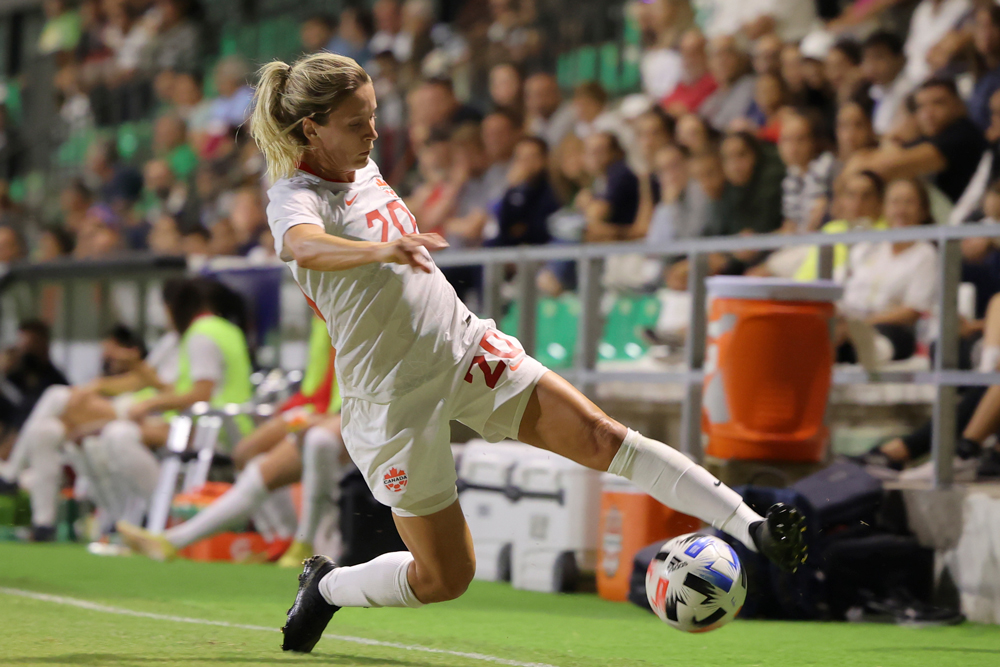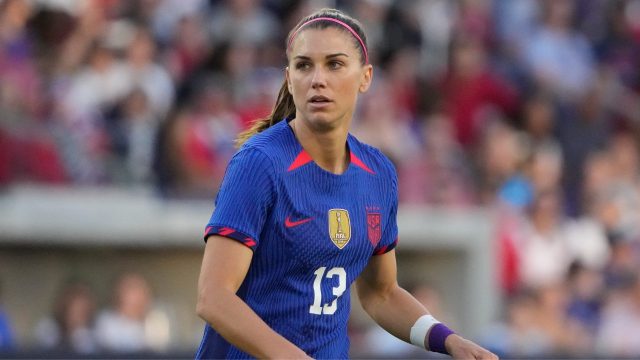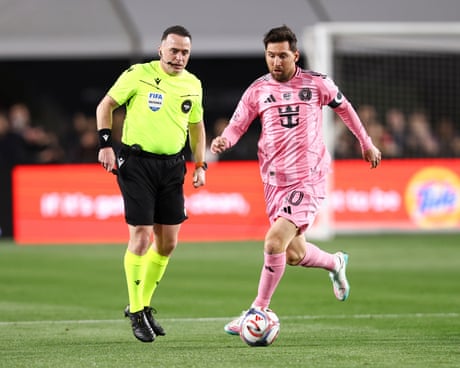
SIXTY-ONE MINUTES into the final game of SL Benfica’s regular season, a season in which they won the league by nine points and conceded just seven goals, the team found itself down 1-0 to last place Amora FC. Benfica had dominated possession for most of the match, but a beautifully timed pass past the Lisbon-based champions defence gave the perfect one-on-one opportunity for Amora to take the lead.
If a big goal was ever needed, though, the team knew it could count on Cloé Lacasse. Eighteen minutes later, she delivered, just as she had done 101 times before in 130 games for the club. Open in the middle of the box, Lacasse received a cross with her back to both her defender and the net. She cut right, turned and shot with her weak foot, burying the ball in the bottom right corner to level the score.
Tears filled the eyes of Lacasse and her teammates at the final whistle of the 2-1 win; it was the last time she would appear in a Benfica jersey, after helping the club win three Portuguese league titles, three Portuguese League Cups, and two Portuguese Super Cups. But despite all that success and all the emotion of the moment, for the 29-year-old Lacasse, who only started playing in Europe in 2015, the eight major honours in four years at the Portuguese club were always part of a bigger journey.
Two years earlier, when the rescheduled Summer Olympic Games took place in Tokyo, the Sudbury, Ont.-born Lacasse was one of the last cuts from Team Canada head coach Bev Priestman’s squad. Having established herself as one of the most electric scorers in the Campeonato Nacional Feminino, she was nevertheless left watching from afar as her country won Olympic gold for the first time after settling for bronze in the two previous Games.
“Before Tokyo I had just started entering the Canadian soccer system. I think I had two camps before that roster was decided,” Lacasse says. “Of course you want to go to the Olympics — no one is going to tell you that they don’t — but I knew it was ambitious … it’s easy to say you can just give up after a moment like that, it’s easy to get frustrated, it’s easy to get mad.”
As understandable as it would’ve been to let that doubt and anger win, Lacasse pushed the emotions aside to focus on her goal. In an open conversation with the forward after the Games, Priestman laid out why Tokyo hadn’t been her time, but also made it clear Lacasse had national team potential. Back in Lisbon, she continued to work on her power, speed, goal-scoring and confidence, and emerged a more focused, well-rounded player.
At her third camp in February 2023, it was immediately clear all the areas Priestman had seen glimpses of brilliance were now staples in Lacasse’s game. She made the World Cup roster and, with Canada set to kick off pool play against Nigeria on Thursday, Lacasse is now focused on the next step: making an impact on the global stage while representing the red and white at a World Cup for the first time.
“My whole career thus far has been about determination, resilience and just preserving through those tough times,” Lacasse explains. “I’m not afraid to bet on myself and I knew after the Olympics the chance would come. Now I’m happy to say that things are going great and I’m just super-enthusiastic about what the future holds with the Canadian team.”
LACASSE’S JOURNEY TO the Canadian national team didn’t take her through the country’s national youth programs, the path walked by so many current players. Intead, in 2015, after graduating from the University of Iowa, where she played all four years on a scholarship, Lacasse moved to Iceland and signed with IBV in the Urvalsdeild kvenna, the country’s top women’s league. She won the League Cup the following year, and the Icelandic Cup in 2017.
Lacasse earned Icelandic citizenship in 2019, which theoretically gave her the option of playing for the national team. But a call-up did not materialize since FIFA denied her request to suit up in her adopted home, and so she left for another challenge.
After being scouted by an agent from Portugal, Lacasse signed a two-year contract with Benfica, which was then in just its second year of having a women’s program. Lacasse made history for the club when she became the first player to score a goal for a Portuguese club in the group stage of the UEFA Women’s Champions League, netting the opener in a 2-1 victory over the Swedish club BK Hacken FF.
“With Benfica, we both took a chance on each other, them being in the second year of their project, and myself not necessarily having a name that’s known in the football world,” Lacasse says via Zoom from Australia’s Gold Coast, where the CWNT is in the final stages of World Cup preparation. “We both gained so much from it, on a European stage and, for me, on an international stage. I think it was definitely great teamwork, and we both leave each other feeling valued and happy for what we’ve accomplished.”
Given her willingness to globe-hop in pursuit of her dreams, it’s clear Lacasse has never been one to shy away from a challenge. The biggest one she faced, though, may have been catching the attention of the CWNT under Priestman, who took the helm in October 2020.
She was certainly on Priestman’s radar — the Canadian women’s head coach first noticed Lacasse in a Champions League match against Chelsea — and she got a national team call-up just before Tokyo. She missed out on the Games, but her senior national team debut finally came on November 27, 2021 when she went on as a substitute in a 2-1 defeat to Mexico, a game in which her potential equalizer went over the crossbar.
Since that debut, Lacasse has appeared in major competitions for her country, including the 2022 CONCACAF championship that saw Canada take home a silver medal, as well as the SheBelieves Cup earlier in 2023. But her real goal was making the roster for the World Cup, one she achieved on July 9, when she was officially named to the 23-player roster.
“For me on a personal level, I always want to be put at a high standard. I always want to show what I can bring to the table, and how I can contribute to this team, and that’s how I made it this far on the club level. Being here on Team Canada, it just goes to showcase everything, all that hard work that’s come throughout the years,” Lacasse says.
“This team is known for its grittiness, for resilience, for each other’s support. These are all things that I also stand by, so having that opportunity to get the call and stand next to these incredible players is definitely an honour. I don’t take any days for granted. I think that’s what makes it kind of special getting this opportunity later, is that none of it’s taken for granted.”
Despite her success in Iceland and Portugal, Lacasse has just one goal in 19 appearances for Canada. However, after a season where she scored 22 goals in 22 league games and five times in six Champions League matches, translating that success internationally is just another challenge Lacasse is eager to conquer. Her confidence and belief in herself are palpable — she knows her capabilities on the pitch — and that faith is mirrored by those around her, including her head coach, who knows how much Lacasse’s involvement in this World Cup means.
“I think she’ll have a pivotal role,” Priestman says. “I think we’ve all seen her growth every time she comes into camp, the tactics. She hasn’t had a rich youth system, like some of the young players that have been brought in, but I think now she has that many caps and, sort of, experiences that the tactical way we play makes more sense.
“She’s thriving. I think she’s dangerous, anytime she’s on the pitch she makes things happen. Her confidence is growing, and she is an integral part of the chemistry, the team spirit off the pitch but also her contribution on the pitch.”
Thriving might just be an understatement for Lacasse, who also recently signed a deal with Arsenal, one of the top clubs in the FA Women’s Super League, and defending League Cup champions. Under Jonas Eidevall, she joins some of the top names in the women’s game, like Beth Mead, Vivianne Miedema, Leah Williamson and fellow new signing Alessia Russo.
“The last couple of years have just been such an upward climb, so I’ve just been really taking it all in, and this last year has been pretty incredible for my career. When Arsenal came on the table after my successful season this year with Benfica, it was definitely a dream, it was a surreal moment in my career,” says Lacasse. “I was like, ‘Wow, okay, all that hard work has paid off,’ and now it’s just continuing forward and showing people what I’ve been trying to accomplish, what I’ve been trying to achieve the last few years.”
Reaching the peak for both club and country has been a long time coming for Lacasse, but the humility and team-first approach she brings is apparent to those around her. With many established leaders like Desiree Scott and Janine Beckie unable to attend the World Cup due to injury, Canada will look to Lacasse to be a leader as they enter a group with Australia, Republic of Ireland and Nigeria.
“She’s such an exciting player, an incredible personality, one of the best humans I’ve ever met, and I’m just so excited she’s getting this opportunity,” says Beckie. “I think with the scope of our team, she has a real opportunity to play and contribute some big minutes in this World Cup.
“She’s coming off a really incredible season with Benfica, huge move to Arsenal; her confidence should be at an all-time high and I’m really looking forward to seeing her play in this World Cup. She’s lightning fast, super skilled and has an eye for goals.
“So we’ll definitely be relying on her to put the ball in the back of the net.”







